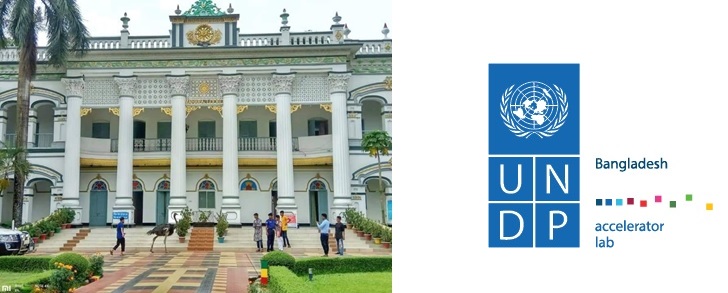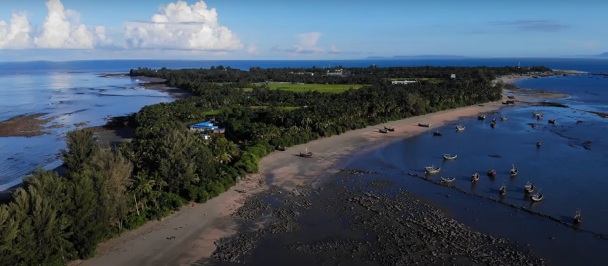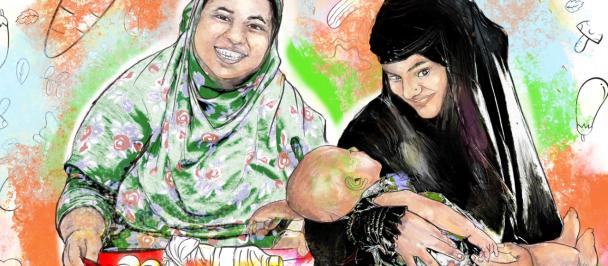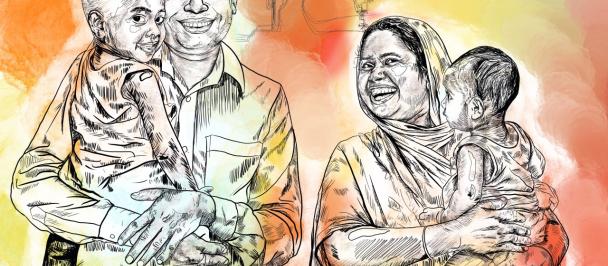By: Ramiz Uddin, Head of Experimentation;
Zimran Khan, Head of Exploration, UNDP Bangladesh Accelerator Lab;
Ranjan Saha Partha, Department of Anthropology, Jahangirnagar University, Dhaka, Bangladesh;
Namia Akhtar, Research Associate, UNDP Bangladesh.
Mohera Zamindar Bari, one of the main tourist attractions in Tangail, beholds the historic architectural heritage.
The UNDP Accelerator Lab Bangladesh very recently has conducted a study to explore the prospects of integrating local communities in the tourism sector in the Tangail district of Bangladesh. This district is famous for its heritage in producing special kind of traditional handloom sarees, firms producing traditional sweets like Porabari chomchom, several historical places including the Zamindar Bari which creates quite a zeal among the tourists.Tangail was selected for exploring tourism development potentials because of its growing popularity as a tourist destination. Since 2017, about 100k people have visited the Zamindar House, and visitors for local hand-loomed sarees continue to grow after the inauguration of the Bangabandhu Bridge.
The tourism sector in Tangail has a strong propensity to integrate local people through nurturing small and medium-sized enterprises (SMEs) that would enact informal employment opportunities and combat rural poverty. Therefore, this exploration was undertaken to identify explicitly the areas in which local communities can engage. Several possibilities were identified through a qualitative inquiry. In-depth interviews, small group discussions, observations and expert consultations. We collected these data while interacting with local intellectuals, tour guides and operators, government officials, local entrepreneurs of various trades – restaurants, handloom saree producers, car rental service providers and formal and informal transport workers, tourists and other key stakeholders. The inquiry reveals that income-generating activities can thrive for crucial commercial products in Tangail, such as hand-loomed sarees and Porabari chomchom (sweet). Also, surrounding historical sites such as Zamindar Bari, Kortia Haat (large market area) have the potential for small local businesses to thrive. Harnessing tourism in the local place necessitates acknowledging the needs of the tourists that are currently unaddressed by the market; for instance, strong demand persists for tour guides, restaurants, transport – all these services would enable a better touristic experience through facilitation of coordination and community management.
Possibilities of informal employment of local people
Tourist sites need food and beverages, transports, and guided tours as tourists look for these facilities for a worthwhile trip experience. These services are lacking in Tangail as visitors cannot find hygienic food, tour guides, or transport facilities to cater to their needs. For example, Tangail hosts a large number of tourists who visit the district centre to purchase hand-loomed sarees. Even though many of them are interested in buying these products directly from the factories, they have to purchase them from the showrooms as many do not know the location of the production sites. The availability of tour guides can help bridging this gap creating additional informal employment opportunities. Also, these customers are not able to access hygenic foods due to the unavailability of quality and clean restaurants, and women customers are often unable to eat at the local restaurants as they do not have proper seating arrangements. Hence, a tremendous opportunity persists here. Family-run restaurants can be set up near the saree shops which hire women chefs and offer restroom facilities to the general customers and the tourists. This will also create informal employment opportunities for women, as they can work in the management of restaurants. However, access to capital is a barrier for setting up small restaurants; hence, joint business initiatives can be built with saree traders and restaurants, or local influentials can come forward in investing in SMEs. A community engagement approach toward nurturing entrepreneurship will develop businesses in the local area, and at the same time create an enriched tourism experience.
Many tourists from the adjacent large cities visit Tangail by renting cars from tour operators from their own cities, who charge higher prices and do not acquire enough informaiton regarding the area. Tourists would be benefitted if car rental services have their local counterpart. That will also enable some tourists to commute to Tangail in public transport and rent car only for local travelling. Thus local drivers can bridge this gap. They possess good knowledge of the place and can serve both as a driver and also as a tour guide, addressing the need. Better coordination with local transport services and tour operators from Dhaka can enrich the travel experience and generate local informal employment. Coordinated services can offer an enhanced tourism experience generating informal employment for local people in the district.
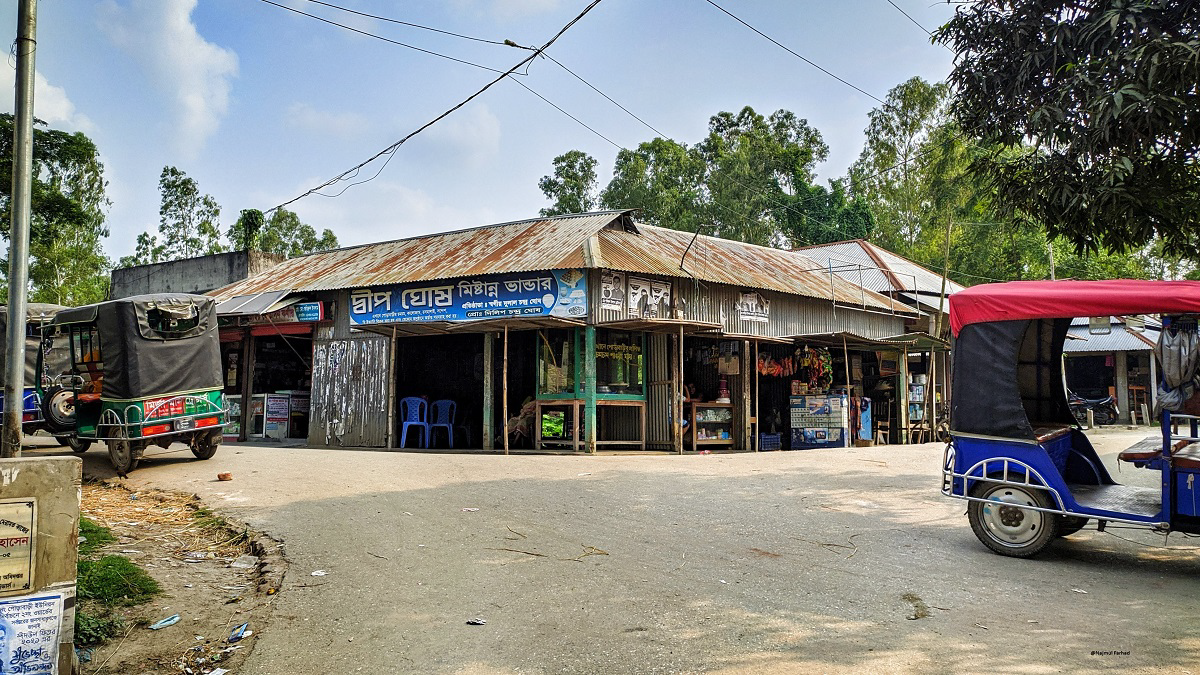
Local transports meeting the transportation need of tourists, creating employment opportunities for local people
Several solutions are in the pipeline for experimentation by the UNDP Bangladesh Accelerator Lab for strengthening labour market linkage with the informal sector. The Accelerator lab proposes following suggestions based on this qualitative inquiry :
- Capacity building for skilled labour source: Enhance coordination through organizing community level discussion among the local key stakeholders to raise awareness of possible coordination, and provide necessary skill development training.
- Localization of transport services for informal employment and informal economy: Linking among tour operators and guides and local rickshaw pullers, microbuses, and CNG drivers to fullfill the need of sourcing transport locally.
- Capacity development for food and beverage business operators: Provide training on hygiene and site management to the catering vendors in order to offer better catering services to the tourists.
- Alternative programs for household-level informal income generation: Home-stay program arrangement for the tourists to stay with the local families.
- A virtual platform for visibility and accessibility: Online booking system adaptation for the Saree producers.
- Creating access to finance for SMEs in the tourism sector: Peer-to-peer loan practice amongst the Tangail tourism-related enterprises, such as local saree houses lending to the local restaurants in proximity and vice versa.
Above discussed actions or activities have the potential to engage local people in tourism, directly or indirectly, and as such can enhance informal employment opportunities for the local communities. Moreover, the local economy will be benefitted by the expanded demand created for local products and services by engaging more tourists. Furthermore, generating employment opportunities for the local inhabitants can improve the quality of life in these tourist sites as well as build confiednt self perception among the local communities.
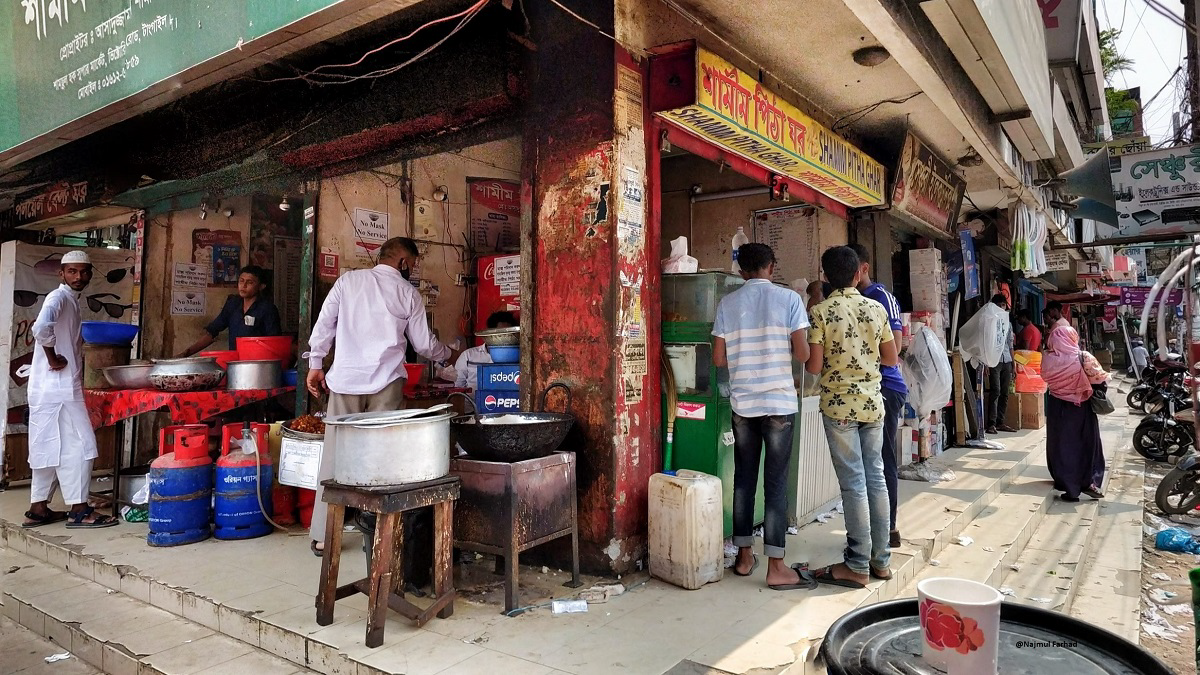
Local food shops get popularity among the tourists which creates employment scopes for local people.

 Locations
Locations